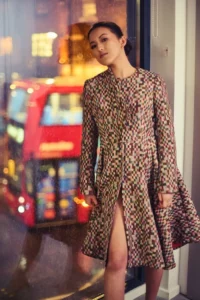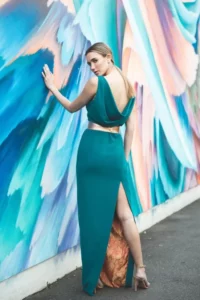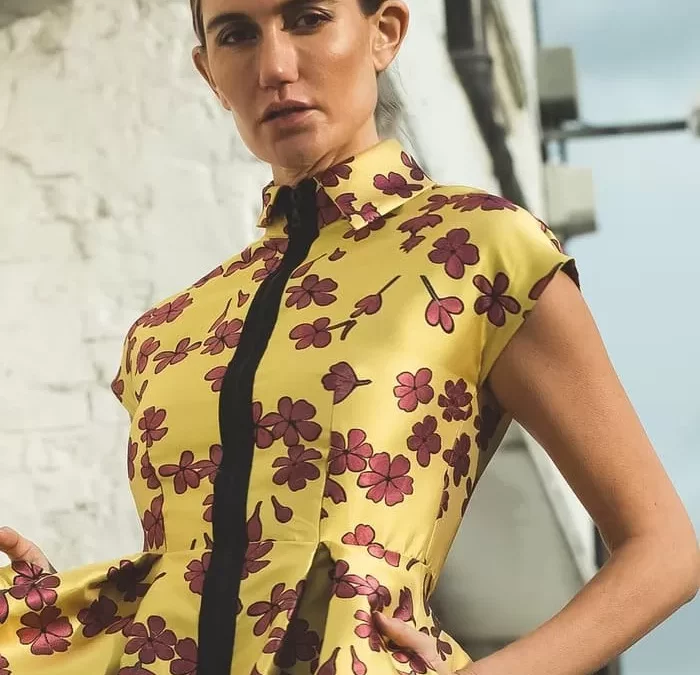Fashion design is well known for being a competitive industry; added to which some fashion designer’s, are often labelled as isolated individuals who have an inability to share ideas with fellow fashion designers, for fear of their ‘design ideas’ being appropriated by others. However, there are those who do not follow this trend, and feel it is their duty to pass on their skillset whilst mentoring others in the trade. Emile Vidal Carr is such an individual, it was a pleasure for me to be invited to his atelier at Thames- Side Studios to learn his industry viewpoints, and his entry into women’s wear fashion.
Design engineering and construction is the description applied to premium women’s wear, Indie brand Emile Vidal Carr. As brand owner and director of his namesake fashion company, fabric is transformed through innovative cuts and artisan sewing techniques.
So who is Emile Vidal Carr? I learn that he wears many hats: father, son, husband, friend, designer, entrepreneur and mentor to others in the fashion industry.
When asked ‘what do you consider as a barrier to start-up companies, especially in fashion’? It came as no surprise that his answer was, access to finance. However undeterred, being able to design and make garments alongside pattern cutting, fed into Emile’s need and desire to know; the process of garment making, citing the influence not only of his mother who taught him to sew, but also a dear friend who is a tailor.
With a hand’s on approach, to working with industrial sewing equipment, Emile cites, it is important to know how to operate this machinery; it is a skill-set within itself, industrial sewing machines, operate much faster than domestic sewing machines. We both felt that the artisan craft of sewing, the ability to produce fine garments is not given the homage it quite rightly deserves, and respect for those behind the scenes is sorely lacking.
Machinists and seamstresses in the garment industry, their knowledge and ability is the lifeblood to a company, he points out that in the UK machinists are well paid now, as opposed to previous years.
His company is also a manufacturer for other fashion design companies, an advocate of in-house training and enterprise. For a lot of businesses in fashion, the impact of the pandemic brought their trading to a halt, and for some unfortunately, they went out of business. However in the case of Emile, being able to pivot his business by providing manufacturing and production in London supported not only his house of fashion, but other designer companies as well.
Whilst managing his brand and the volume from external orders, Emile is not averse to working alongside his co-workers on any or all of the various industrial sewing machines; this in my opinion is brilliant. It speaks of a CEO for whom teamwork is important, and is not afraid to roll up his sleeves to get the job done.
It also speaks to his appetite for being an independent brand that is not reliant on off-shore manufacturing. Garment manufacturing within the UK was once championed for its quality, and attention to detail, it’s awesome that a fashion company such as his, still embraces those core values of old.
Emile’s navigation to being a premium women’s wear brand was inspired by his wife, who is also his muse. Prior to this, the ‘Emile Vidal Carr’ label its initial outing were garments predominately made for clubbing, ‘raving’ as it was then, and more deconstruction, than the sculpted silhouettes he now makes. Under his wife’s influence, the elegance of aesthetic cutting techniques, would put his raving days behind him, and he’s glad to have taken this new direction. In appreciation of fellow designers, he makes reference to the works of Romeo Bryan, the late Virgil Abloh, and Roland Mouret, to name a few.
What is evident to me during our conversation is that Emile is a designer who considers the landscape of fashion to be open to everyone. Some designers are not as willing to be open, and share with other designers their knowledge or expertise, which is a shame; however this is not my experience talking with Emile.
Moving onto his ‘dislike of the fashion industry’, this is interesting, as he mentions the educational system leaves a lot to be desired especially for graduates. The need for more work based placements, he feels is the way forward, as opposed to solely, the theory of fashion study. He goes on to say “things move on so quickly in the fashion industry, that by the time students leave education, some of what they have learned, may not have the same relevance in the work place.”
Creating his own loyal following of women wearing his garments, I ask about the women he would like to see wearing an ‘Emile Vidal Carr’ piece?
He cites former First Lady Michelle Obama from across the pond USA, as for the UK, Emile is an admirer of Baroness Karren Brady CBE, business entrepreneur, former Vice Chairman for West Ham United Football club, and motivational speaker, these formidable women represent ‘the look’ of his design aesthetic. 
As I get ready to wrap up this inspiring conversation, I ask ‘what drives him’? He laughs saying “a healthy fear of failure spurs him on” such is his honesty, ‘and for the future’? Emile plans to continue growing his brand internationally, without compromising on his core values, of quality, craftsmanship, and business acumen, whilst supporting the next generation of up and coming designers.
Emile clearly demonstrates that having a UK based fashion manufacturing/ production, company has elevated his business through troubling times, and continues to grow. This I find to be encouraging…
For more information: www.emilevidalcarr.com.
Author: Coral Turner

